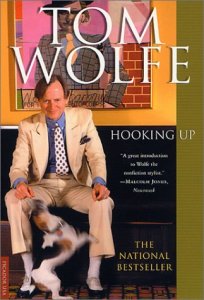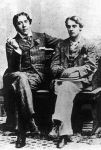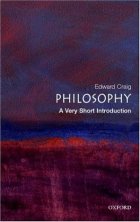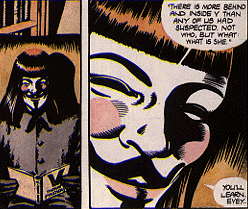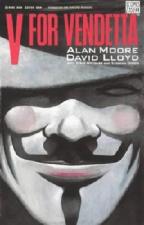Of Friendship and Objectivism
Best Friends are individuals who use each other at an accelerated frequency.
-girlanachronise
According to Russian-American philosopher-novelist Ayn Rand, Objectivism holds that Morality obsoletes as a pivot to Right or Wrong. Rather, it’s a effect of pursuing One’s own happiness in self-interest.
Simply put, the one and only Moral that Man can truly uphold is: Egoism.
How available then, one would ask, is Friendship from an Objectivist’s perspective?
Readily.
If Friendship is measured in terms of self-achievement, a reciprocal Need or Use for both individuals must first be present. Consummation of the relationship, leading to actualization of one or both individuals, can only precede if Need or Use is maintained.
Tom Wolfe on Deconstruction

“Oddly, when deconstuctionists required appendectomies or bypass surgery or even a root-canal job, they never deconstructed medical or dental ‘truth’, but went along with whatever their board-certified,profit-oriented surgeons proclaimed was the last word. “

CUBE and Existentialism
Exit, does it Exist?
‘
HOLLOWAY
It’s all the same machine right. Pentagon. Multinational coorporations.The police! If you do one little job. You build a widget in Saskatoon.The next thing you know, it’s two miles under the desert, the essentialcomponent of a deathmachine.I was right! All along my whole life I knew it.I told you Quentin. Nobody’s ever call me paranoid again. We gotta get outof here and blow the lid of this thing.
WORTH
Holloway, you don’t get it.
HOLLOWAY
Then tell me, please, I need to know.
WORTH
It’s maybe hard for you to understand, but there’s no conspiracy. Nobodyis in charge. It’s a headless blunder operating under the illusion of a masterplan.Can you grasp that? Big brother is not watching you.
QUENTIN
What kind of fucking explanation is that?
WORTH
It’s the best you´re gonna get. I looked and the only explanation I can come to is that there is nobody up there.
QUENTIN
Somebody had to say yes to this thing.
WORTH
What thing? Only we know what it is.
QUENTIN
We have no idea, what it is.
WORTH
We know more than anybody else. I mean somebody might have knownsometime, before they got fired or voted out or sold it. But if this place ever had a purpose, then it got miscommunicated or lost in the shuffle. This is an accident, aforgotten propetual, public, worksproject. Do you think anybody wants to ask questions? All they want is a clear conscience and a fat paycheck. I mean, I lead on my desk for months. This was a great job!
QUENTIN
Why put people in it?
WORTH
Because it’s here. you have to use it or admit it’s pointless.
QUENTIN
But it is pointless!
WORTH
Quentin… That’s my point.
Philosophical References
I see Holloway as the voice against Existentialism.
I see the Holloway in all of us.
Holloway is our liability to Reason, to wax Fatalism over our own meaningless Existence.
Holloway is Absurd due to her hunger for reasonable-ness from an Existence that cannot feed her with it.
By believing that ‘Pentagon. Multinational coorporations, The Police’ is responsible for her plight, she is succumbing to a bout of Bad Faith, thus, renouncing the control she can have as a free being.
Holloway’s way is indeed, hollow.
Worth asserts that Freedom is not as primary to Man as we would like believed.
What we really want is, Comfort and happiness, which many of us would gladly trade Freedom for; without hunger, without the pangs of conscience. To quote Radiohead, Fitter, happier, more productive pigs in a cage on antibiotics.
Worth understands that we are nothing but atoms, pieces of dusts, darting around space, aimless; gone wrong like always, like before.
Transcendentalism in freak folk: Devendra Banhart
I came across Devendra Banhart while scavaging thru Insound for downloads couple of years back; when Kai(redelephant) was the only contributing member of this site. (God knows where the bugger went, please let me know if you have any remote information leading to his whereabouts coz we miss the guy terribly!)
The Body Breaks is one of the earliest tracks i’ve heard and needless to say, i was hooked. It struck me as something out of a late-6o’s vinyl, what with that stalking, blues-folk riff fingerplucked in elastic time and trembling trembling nasal lilt ;somewhat Nick Drake-ish(pardon my musical inexposure, i was just a wee nymph then… any folk-guitar-and-vocals combination would immediately be followed by exclamations of ”so Nick Drake!’ or ‘how Elliott Smith!’ however, my opinion did change after exploring Bryter Layter) but, with a spook vibe, raw, surreal and intensely refreshing due to his unconventionally uncompromising philosophy of being able to ‘write and sing shit about anything and everything'(forgot the source, was a long time ago). Ay Mama from Niño Rojo is a searching, ruminative chant which somehow evokes a sense of mysterious spiritual well-being. The Black Babies, an early ep, is possibly recorded on a four-track analog recorder as warm overtones and an all-too-apparent tape hiss is detected.
Has modern music lost its magic to Digital Audio Workstations, over-mixing/producing, and the click-track monster?
Is fluidity in rhythm seen as a technical deficiency on a musician?(Hey if that’s really the case then Rubato should not be listed in the musical dictionary of italian terms, right?)
How about the loudness war? Does amplitude equates aptitude?
As artists/musicians, are we afraid to
‘live deliberately, to front only the essential facts of life’ ?
to seek from the eclectic soul an individual vision of beauty born from necessity;
much like Banhart, a musical-Thoreau.
Or would we prostrate to pre-concieved industry standards and hex our masterpieces with mindless VST plugins, metronomes and a whole plethora of digital processes.
Indeed, it’ll be sad to learn that
‘when it came time to die, to discover that I had not lived.’
Oscar Wilde and Greek Love
I am uneasingly alarmed by the ratio of straight to gay men in the creative industry. As a young bisexual female fed on disgustingly Asian values seeped with messages of filial piety and self-less procreation,bringing home the dude who’s gonna make Ma proud seems somewhat like a task.
Oscar Wilde, the great Victorian poet and playwright, notoriously known for his appetite for young renters and his highly volatile relationship with Lord Alfred ‘Bosie’ Douglas, wrote in De Profundis ‘ I am a born Antimonian. I am one of those who are made for exceptions, not for laws.’ According to ‘The Secret Life of Oscar Wilde’ by Neil McKenna, the Antimonians were ‘ a sixteenth century sect of dissenters who believed they were God’s chosen people, the elect, predestined for salvation, and consequently they were not bound by conventional moral laws’.
The term ‘Greek Love’ was also coined by Wilde with reference to male-to-male romantic(and sexual) bonding practiced in Ancient Greece. Legend has it that Ganymede, a beautiful Trojan prince was abducted and anally-raped by the god Zeus and then kept as his catamite.
Indeed, it is hardly surprising that a man with seemingly divine brilliance like Wilde should also covet ‘divine’ pleasures.
Pederastic bigot in some delusional bubble of grandeur?
Does it mean that, according to Wilde’s gospel of ‘The Love that dare not speak its name’, the majority of heterosexuals(Unchosens) are damned to sordid, mundane existences since their tastes and habits are less than ‘evolved’?
Is that why I’ve never met a guy who wants to jump my skinnies and knows his art history at the same time?
I guess i’ll stick to Andre Raffalovich’s theory- that a hetereosexual’s destiny is to make babies whereas a homosexual should channel his sexual angst and abnormalities to nobler pursuits like Art!!!
As always, i’ll go like ‘bummerz..’ whenever i’m stalking out some cute gay artist/musician/model’s facebook profile…..
Please Plant this Book. Richard Brautigan.
I came across a pretty cool website which has put up aRichard Brautigan’s Please Plant This Book, a 1968 books that consists of eight packets of garden seeds, each with an imprinted poem. Why the act of planting text into the earth? Each poem reads like a tangible ray of hope and a prayer that is offered to the living. I somehow feel that Brautigan is weary of too much knowing and has chosen to replace knowledge with begone innocence. Even thoughts buried in soil, will eventually decay.
Flash Version of the book | Text Version of the Book
Venus in 3D. Animation = Resistance?

“Based loosely on works such as Titian’s Venus and paintings by the Baroque artist Peter Paul Rubens, Sleeping Beauty is meant to introduce direct sensuality into the virtual realm, but employing an idea of beauty defined by a woman rather than men in which the subject does not express conventional canons of body and facial type. In so doing Sleeping Beauty inverts the typical 3D character-based animations of interactive gaming, not just through its visual language buy by also rejecting their violence and aggressive speed.”
Fascinating piece by Claudia Hart, art critic and visual artist. Read more about Hart and this piece at this link. I don’t think it completely inverts voyeurism but somehow enhances it. The langurous movement embedded within the image is liberating in a sense but it invites continued observation, and hence the tendency to secretly voyeur.
Public Sculpture Riot
A collection of public sculptures from all over the world. Some of them are utterly pornographic in nature and some are semi-Futurist (ala Boccioni). I like the static ones. They seem to be so damn defiant in this wierd way, of their environment and the onward gaze. See more pictures here.
Philosophy 101
I’ve received gotten the audiobook for Philosophy, A very short introduction. BC magazine writes:
Craig’s approach is to explain the project of philosophy and to examine a few of the problems that philosophy has addressed. His definition of philosophy is delivered in a kind of parable. Imagine when human beings became conscious that sensory data could be interpreted through concrete symbols and ideas. An animal track means an animal has passed, which might be pursued as prey, or avoided. Human beings perceived and visualized events by indirect evidence and ideas, and then considered how human beings could act to influence events. Human beings became aware of forces of nature and events beyond human control. Human beings investigated nature, but encountered mysteries, and developed a sense of the supernatural. The project of understanding and explaining nature is science, and the project of recovering from the shock of mystery is philosophy.
I’ve tried listening to it and it seems pretty interesting. It’ll be worth a listen to just find out how on earth Craig condenses over 2000 years of philosophical thought in a little over 3 hours.
Mamet’s Wicked Son

The New York Times reviews David Mamet’s The Wicked Son: Anti-Semitism, Self-Hatred and the Jews. I honestly haven’t seen his film Homicide and so I’m not too convinced about the reviewer’s comments. Still, an interesting book to check out.
But there was a slight problem with Mamet’s Jews: They were unrecognizable. Their anxieties seemed from an earlier era. They belonged to no real place, just one of Mamet’s Hopperish lonely cities. They spoke Mamet-speak, which is to say, a language so hyperreal that it sometimes sounded quite unreal. They were, in fact, contrivances, created to highlight Mamet’s hobgoblins and hobbyhorses. One encounters the same schism, and the same ambivalence, in “The Wicked Son,” Mamet’s examination of the modern Jewish psyche. Like everything he does, it is blunt and bracing, honest and provocative, original and gutsy. At the same time, it’s not exactly clear which Jews Mamet is talking about, what decade they live in, how fairly he treats them or even how many of them there are.
Remembering War: Frontline Verses
The New Trade
In the market-place they have made
A dolorous new trade.
Now you will see in the fierce naphtha-light,
Piled hideously to sight,
Dead limbs of men bronzed in the over-seas,
Bomb-wrenched from elbows and knees;
Torn feet, that would, unwearied by harsh loads,
Have tramped steep moorlands roads;
Torn hands that would have moulded exquisitely
Rare things for God to see.
And there are eyes there – blue like blue doves’ wings,
Black like the Libyan kings,
Grey as before-dawn rivers, willow-stirred,
Brown as a singing-bird;
But all stare from the dark into the dark,
Reproachful, tense, and stark,
Eyes heaped on trays and in broad baskets there,
Feet, hands, and ropes of hair.
In the market-places . . . and women buy . . .
. . . Naphtha glares . . . hawkers cry . . .
Fat men rub hands . . .
O God, O just God, send Plague, lightnings . . .
Make an end!Louis Golding
Rivaling the best of Owen’s work, this powerful poem is taken from Voices of Silence: The Alternative Book of First World War Poetry, by Vivien Noakes, published by Sutton Publishing. Released for Remembrance Sunday, this collection of frontline verse showcases work by several poets, including Hampden Gordon and Jessie Pope. See more selections at Times Online.
Podslammin’
I’ve written about Podslam above and I still think there their website is really cool. Bringing performance slam poetry onto the web has given much needed exposure for these wonderful artists. Their rhymes and songs spit out with so much fury and passion you’ll feel like writing yourself. The theme of writing and rewriting your history with words and oral tradition holds strong with these guys.
See more at Podslam.
Aspen Magazine




Aspen is exactly the magazine or journal that I've always wanted to create but never did have the chance or time. It's got one element that I really like in a journal; media-rich content that sees critical text juxtaposed next to artwork. Each comments and reflects on the other without either dominating the rhetoric. While looking or listening to the audio or visual art in the each issue of Aspen, difficult theoretical postulations become somehow easier to understand, as relative connections become more fluid and apparent. The content itself is fascinating, from analysis of pre-modern Asian paintings, spoken word/avant-pop/classical phonograph recordings to scrapbook art, all of which are rhizomed and networked into a sexy mass of plausible cultural hypothesises.
Aspen has been around for a while and they used to have a print version, but now only exists on-line, which is actually a better platform for its hyper-textual content.
Check it out… it's a must-read. Oui, c'est incroyable.
Anyone interested in starting an online art-literature journal thingy together?
Derrida’s Paradigm

Remarks on Deconstruction and Pragmatism
Jacques Derrida
First, I would like to say, even if this shocks certain amongst you and even if I myself took my head in my hands when Richard Rorty said that I was sentimental and that I believed in happiness, I think that he's right. This is something very complicated that I would like to come back to later, but I am very grateful to Richard Rorty for having dared to say something very close to my heart and which is essential to what I am trying to do. Even if it appears very provocative to say it and even if I began by protesting, I think that I was wrong. I am very sentimental and I believe in happiness; and I believe that this has an altogether determinant place in my work. There are so many rich and complex matters to which to respond and I cannot, in improvising, respond to all that has been said. I have the choice between several possibilities and I am going to choose the following: I am going to offer some introductory general remarks after which I will try to respond to some of the questions posed by Simon Critchley, Ernesto Laclau and Richard Rorty.
Rorty on Deconstruction-Pragmatism
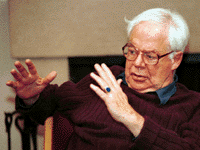
Remarks on Deconstruction and Pragmatism
Richard Rorty
Derrida is read, by conservative know-nothings in the United States and Britain, as a frivolous and cynical despiser of common sense and traditional democratic values. Many of my colleagues in the Anglophone philosophical community support this reading, and attempt to excommunicate Derrida from the philosophical profession.
Derrida is read by his fans in American departments of literature, on the other hand, as the philosopher who has transformed our notions of language and the self. They think of him as having demonstrated the truth of certain important propositions, propositions the recognition of which undermines our traditional ways of understanding ourselves, and understanding the books we read. They also take him to have given us a method-the deconstructive method-of reading texts: a method which helps us see what these texts are really about, what is really going on in them.
I find both these ways of reading Derrida equally dubious, and I shall discuss them in turn.
Deconstruction vs. Pragmatism
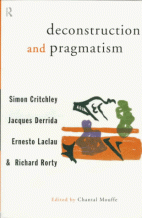
I've been reading Deconstruction and Pragmatism, a collection of essays by Chantal Mouffe, Richard Rorty, Jacques Derrida Ernest Laclau and Simon Critchley. This is an excellent book for several reasons, primarily because it examines the relationship that deconstructivist and pragmatist theories have on the foundations of rationalist democracy, a topic that I'm fascinated with. In many aspects, both Derrida and Rorty's work undermine the dominant rationalist approach that underlies most academic and political infrastructures.
Mouffe writes:
Derrida and Rorty are at one in refusing Habermas's claim that there exists a necessary link between universalism, rationalism and modern democracy and that constitutional democracy represents a moment in the unfolding of reason, linked to the emergence of universalist forms of law and morality. They both deny the availability of an Archimedean point-such as Reason-that could guarantee the possibility of a mode of argumentation that would have transcended its particular conditions of enunciation.
Nevertheless, their critique of rationalism and universalism does not prevent them being strongly committed to the defence of the political side of the Enlightenment, the democratic project. Their disagreement with Habermas is not political but theoretical. They share his engagement with democratic politics but they consider that democracy does not need philosophical foundations and that it is not through rational grounding that its institutions could be made secure.
The book suggests, through the critical contributions of each author in a roundtable symposium, that it is possible to theoretically develop and outline a non-foundationalist concept about the issue of democracy.
Rorty and Derrida have both very interesting and genial essays, both of which I haven't seen before on the internet. I'll put them up in the next few posts. 🙂
Technorati Tags: rorty, derrida, deconstruction, pragmatism, hegemony
Elephant Links: Zinn, Stanford Writing.

Mark Quinn, Winter Garden 6 (2004)
-
This is an excellent Stanford University blog which focuses on creative and academic writing. Posts come from PHD and undergraduate students as well as Professors. A great read.
-
Howard Zinn explores the origins of American Exceptionalism and offers two insightful reasons on the vulnerability of the American press and citizens to suggestions and lies.
Technorati Tags: stanford, zinn, writing
Las Vegas, America. Intellectuals.

Just had to post this when I saw it. Francis Fukuyama meets with Bernard Henry-Levi and complains about Henry-Levi's impression of Las Vegas in Levi's recent book American Vertigo. This is a fun discussion to read.. other topics of discussion include views on American vices, neoconservatives, religion and the role of public intellectuals in future.
Fukuyama explains the birth and true meaning of Las Vegas:
The best piece explaining the ethos of Las Vegas (and the American West more generally,) is a short essay by Joan Didion entitled "7000 Romaine, Los Angeles." In it, she explains that Howard Hughes founded modern Las Vegas in 1967 because he, a reclusive insomniac, couldn't find a place to buy a cheeseburger in L.A. at three o'clock in the morning—so he created a whole city to cater to that need. It had nothing to do with sin or sex, but rather the perpetual American desire to reinvent oneself in a place where conventional expectations don't apply.
In case anyone is interested, Joan Didion's essay comes from her book Slouching in Bethlehem. Although I haven't read the book, Im pretty sure the title of the book came from a Joni Mitchell song title and has something to do with this Yeats poem.
Elephant Links: Islam-SciFi, Writing Tips
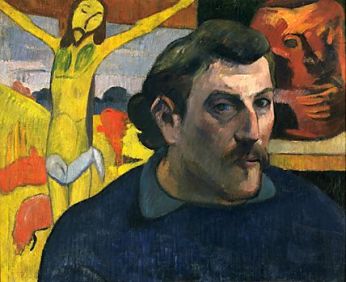
Self-portrait with the Yellow Christ, Paul Gauguin (1890)
Ancient literary forms, even-metered or otherwise, can find inadvertent modern expression in contemporary everyday speech.” (tags: theory)
From the Free Range Librarian blog, MFA student Schneider offer 18 helpful tips on how to develop your writing skills. (tags: writing)
“People from Islamic backgrounds were generally portrayed with negative conotations in stories set in the near future but characterizations of Muslims in the distant future are generally positive.” (tags: literature)
Technorati Tags: Islam, Scifi, writing, literary
Elephant Links: Ecological Disaster, Lament, Moore

Tiger Hunt, Eugene Delacroix (1854)
Baudelaire, who was a great admirer of Delacroix, wrote about this work:
“Delacroix, an alchemist of color, miraculous, profound, mysterious, sensual, awesome: explosive color and subdued color, a penetrating harmony. The gestures of man and animal. The scowl of the beast, the snufflings of animality.”
An excerpt from this wonderful book where Borradori talks to European intellectuals, Habermas and Derrida about Terrorism and the signifance of 9-11. (tags: theory)
“It may seem impossible to imagine that a technologically advanced society could choose, in essence, to destroy itself..but that is what we are now in the process of doing.” (tags: reviews)
“If I’ve learned anything from hanging out with the Eastern European dissident crowd, it’s make no decision out of fear.”. I loved the fact that Sterling read a poem by Carl Sandburg at the end (tags: news)
Second part of the The Beat’s interview with Alan Moore on V for Vendetta. (tags: writers)
Technorati Tags: Ecology, Philosophy, Terrorism, Delacroix
Alan Moore Interview: V for Vendetta
The Beat has a fascinating interview with Alan Moore, the legendary English writer who wrote canonical graphic novels such as the Watchmen, V for Vendetta (yes, the movie starring Natalie Portman) and From Hell, a brillant, complex and polyphonic semi-biography of Jack the Ripper. Moore's writing completely revolutionized the comics industry and his poetic, lyrical style brought an incredible density to characters such as Swamp Thing, a figure erstwhile considered to be too emotionally vacant to depict in a meaningful way.
In this interview, he expresses his general disgust for the American comics and film industry:
I'm perhaps overstating my case here a bit, but I think I lent an awful lot of literary and intellectual credibility to the American comics business and to the comics business in general when I entered it. I don't feel the same way about comics any more, I really don’t. I never loved the comic industry. I used to love the comics medium. I still do love the comics medium in its pure platonic, essential form, but the comics medium as it stands seems to me to have been allowed to become a cucumber patch for producing new movie franchise.
Technorati Tags: Literature, Comics, Moore, Vendetta
Elephant Links: Manhatten, Derrida, AudioBooks

Metropolitan Triptych, Francis Bacon (1981)
LibriVox provides free audiobooks from the public domain. Volunteers record chapters of books in the public domain, and then release the audio files back onto the net. (tags: audiobooks)
A blog from the perspective of an agent. Useful info for anyone looking to get their work published. (tags: blogs)
A lovely map indexed with literary entries involving Manhatten by writers such as Kerouac, Plath. Stephen King, Pynchon, and Langston Hughes. New York must be one of the most written-about places in the world! (tags: literary)
“Deconstruction, the philosophical method he promoted, means not destroying ideas, but pushing them to the point where they begin to come apart and expose their latent contradictions.” (tags: philosophy)
Technorati Tags: Derrida, Audiobooks, Manhatten, Literary

